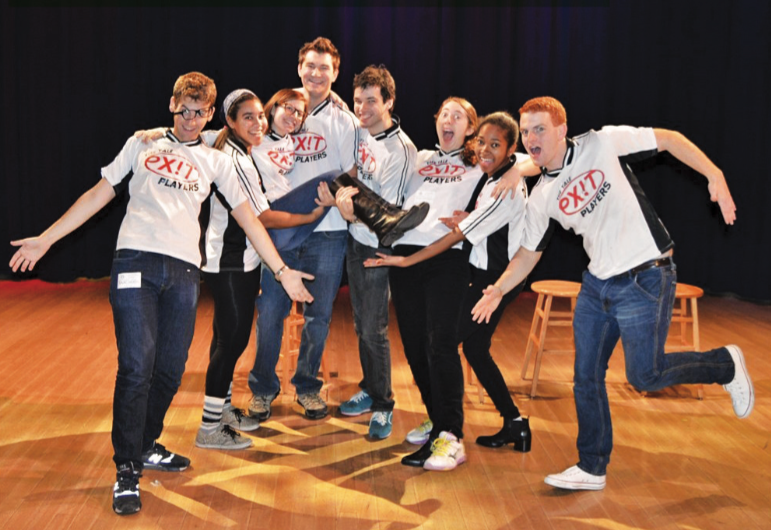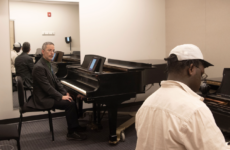“Where would you go on your first date?” “How much money do you make?” “What is your opinion on Crocs?” Different audience members asked a variety of questions to three “single and ready to mingle” bachelors on stage: Viktor, a neighborhood doctor capable of solving all cures; Natalie, a lawyer looking to escape the anxiety of her job; and Sam, a racecar driver who “talks real slow but drives real fast.” It was up to Tristan Jamidar ’18 to determine who he wanted to go on a date with.
There were no actual bachelors on the stage, as far as we know, but this was the opening act of the improv performance by the Yale Ex!t Players, the group that, in 1984, introduced improv to Yale. In the decades since, the group has performed hundreds of shows across the country, at theaters, schools, and festivals. The group has studied improv at the iO Theater in Chicago, as well as the Magnet Theater and the Upright Citizens Brigade Theater in New York.
Improv is a form of comedic theater in which all aspects of a theater production, including plot, characters, and backstory, are all made up on the spot. The initial ideas often come from members of the audience, and the actors quickly develop a story that has never been performed before.
For the main show, the Yale Ex!t Players took one word and developed this word into a complete story with a plethora of personalities involved. The word, chosen by an audience member, was “brick.” The story began with a girl delivering a monologue about a brick fountain on a mountain, the water flowing out of the brick mouths of old men. More and more characters were added to the plot, including two brothers traveling to Nebraska in order to fulfill their mother’s wish of spreading her ashes in her home state, two freshmen spray-painting a wall while reflecting on their lives, a fairy and boy who wanted to be the fairy’s assistant, and a group of musicians playing Tchaikovsky’s Third in a park while mocking the trianglist for her lack of rhythm.
Ms. Kalya Yannatos, head of the A0rts Department, helped bring the group to campus. She said, “I think it’s really valuable for us to have a relationship with our neighbors down yonder. Yale is so close, so why not work that I-91 corridor?”
Like the audiences they perform for, many of the Yale students in Ex!t are all but brand new to improv. Deb Monti, a sophomore in the group , said, “I had never done improv before, like a lot of us. It seemed like a good way to meet a good group of close friends, and because there are usually seven to nine of us, it’s so tight-knit.”
Hannah Billingsley, a junior in the group, added, “I did a little bit of improv in middle and high school, but I was also an athlete, so I didn’t have much time for theater. A few of my friends were also trying out for improv, so I saw it as an opportunity to create new worlds.”
The challenge of improv is to devise both a frenetic, haphazard world in which anything goes, and, by skit’s end, to knit those disparate strands into a unified whole. Improv can seem simple, its underlying complexity overshadowed by laughs from the audience. “Improv uses life skills that you wouldn’t normally think of, like listening to other people and being supportive,” Billingsley said. “I wasn’t necessarily expecting that, but it is something that is really helpful in my everyday life.”
Listening, offering support, other key life skills — yes, before the end of the night’s main skit, those brothers had made it to Nebraska.





